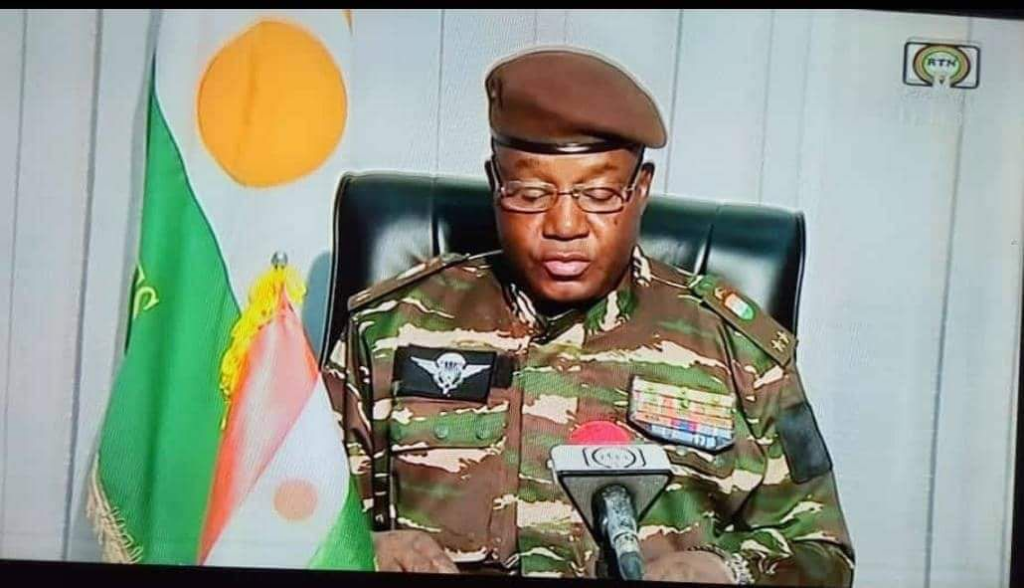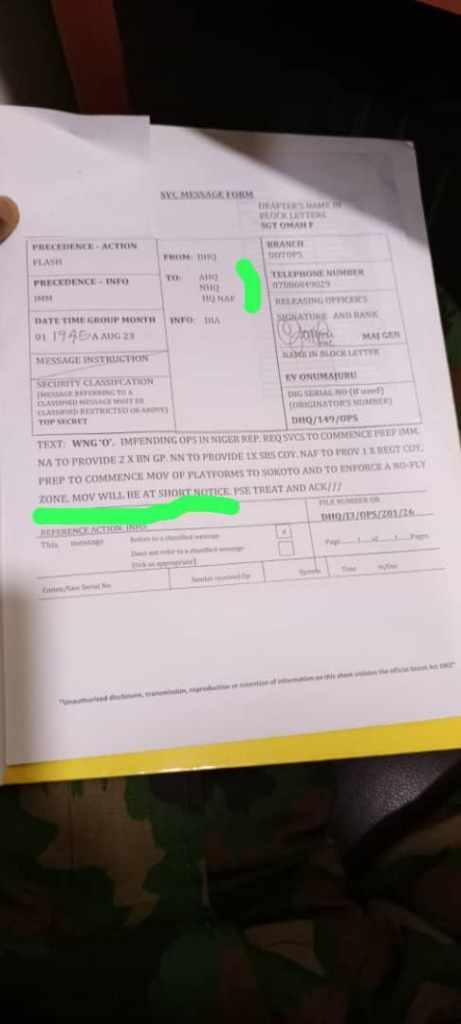A classified leaked document from the Defence Headquarters reveals that the Nigerian government is planning to deploy troops of the Nigerian Army, Navy and Air Force on “short notice” to Sokoto, a state sharing border with the troubled Republic of Niger where the military junta had seized power from President Mohamed Bazoum.
The Economic Community of West African States (ECOWAS), under the leadership of Nigeria’s President, Bola Ahmed Tinubu, sanctioned and threatened to invade the francophone West African country if the putschists refused to revert power to the ousted civilian government of President Mohamed Bazoum within a week.
Bazoum was ousted by its presidential guards led by Abdourahamane Tiani [now Head of State]. The country’s military later declared support for the coup d’état, claiming it was in its efforts to prevent massive bloodletting.

Abdourahamane Tiani, Military Head of State, Niger Republic
But the military junta rejected the warning and unanimously said: “We want to once more remind ECOWAS or any other adventurer of our firm determination to defend our homeland.”
The coup plotters went ahead to seek Russia’s help as ECOWAS considers military intervention. They said they seized power as a result of “bad governance and worsening security.”
THE LEAKED DOCUMENT
Ahead of the “impending operations” in the Niger Republic, the document reveals that the Nigerian Army, Nany, and Air Force should “commence preparation immediately” as “movement will be at short notice,” the leaked document states.
To this, Nigeria alongside other West African counties that are not in support of military rule would deploy soldiers under the Economic Community of West African States Monitoring Group, a military subunit of the ECOWAS.
The leaked document was signed by Major General EV Onumajuru who was, during a major shake-up in the military, redeployed from the Department of Special Services and Programmes (Army) to Defence Headquarters.
The document further instructs: “NA TO PROVIDE 2 X BN GP, NN TO PROVIDE 1X SBS COY, NAF TO PROV 1X REGT COY. PREP TO COMMENCE MOV OF PLATFORMS TO SOKOTO AND TO ENFORCE A NO-FLY ZONE MOV WILL BE AT SHORT NOTICE…”
DECODING THE DOCUMENT
WikkiTimes understands that the document was encoded in military language. But we contacted a serviceman in the Nigerian Army who decoded the document.

The document
He, however, opined that there was a typographical error in the memo. The serviceman said the GP attached to Nigerian Army (NA) was supposed to be “GPMG” which he translated as “General Purpose Machine Gun.”
Further decoding the memo, he said the Nigerian Army, as instructed in the document would provide “a battalion led by two officers, the Nigerian Navy (NN) would provide one Company (COY) of Special Boat Service (SBS) to be led by one officer and the Nigerian Air Force (NAF) would provide a Company (COY) of Regiment which would also be led by one officer.”
He added that a battalion, normally, consists of nearly 800 soldiers or more, “and it can not be led by just two officers. They will have about 12 officers to lead the battalion.”
But because of “manpower”, he said a battalion could be around 400 officers below. “It could be 150, 200, 250 or 400,” he explained, adding these ranges could be led by two officers.
“Normally, a battalion should be led by a major, but due to manpower issues, we often have a lieutenant colonel or captain,” he explained.
For instance, the 800-man battalion, he said, could be divided into groups or companies.
“They can be divided into companies like Alpha, Beta and Charlie. Hardly we get up to Delta because of manpower,” he revealed.
This comes amid massive resignation by men of the Nigerian Army over alleged corruption and low morale among others as seen here and here.
WikkiTimes could not immediately hear from the Director of Army Public Relations, Brigadier General Onyema Nwachukwu. He did not pick up several calls placed through his line. Also, a text sent to him had not been responded to at press time.
WHAT THE IMPENDING WAR MEANS FOR NIGERIA
As the tension heightened in the Niger Republic, analysts said it would lead to humanitarian crises as citizens of Niger escaping repressive military rule and displaced Nigerians [by banditry] taking refuge in the West African country would return to border towns in northwestern Kano, Katsina, Kebbi, Jigawa, Sokoto and Zamfara states.
The analyst also argued that any show of military might by ECOWAS could lead to war between already-divided West African Countries. Further, they fear that a military invasion of Niger could worsen Nigeria’s multidimensional insurgency, farmers-herders crisis, banditry and kidnapping for ransom.
As the coup plotter held Bazoum and his affiliates hostage, their counterparts in Guinea Mali and Burkina Faso, declared support for them, saying a fight against Niger is a fight against Guineans, Malians and Burkinabés.
“The Transitional Governments of Burkina Faso and Mali are deeply indignant and surprised by the imbalance observed between, on the one hand, the celerity and the adventurous attitude of certain political leaders in West Africa wishing to use force armed forces to restore constitutional order in a sovereign country.

From left: Ibrahim Traoré, head of state Burkina Faso and Colonel Assimi Goïta, head of state, Mali
“And on the other hand, the inaction, indifference and passive complicity of these organizations and political leaders in helping states and peoples who have been victims of terrorism for a decade and left to their fate.
“In any case, the Transitional Governments of Burkina Faso and Mali invite the living forces to be ready and mobilized, in order to lend a hand to the people of Niger, in these dark hours of Pan-Africanism,” the governments of Mali and Burkina Faso, jointly declared in a statement on Monday.
For Second Time, Bauchi Monarch Kidnapped — His Abductors Want N20m
Guinea also followed suit. The Head of State in Guinea, Mamady Doumbouya, said sanctions advocated by ECOWAS, including military intervention, are an option that cannot be a solution to the current problem.
He added that the sanctions would lead to a human disaster whose consequences could go beyond the borders of Niger.
As the tensions continued, the governments of France and Italy have begun the evacuation of their citizens.




